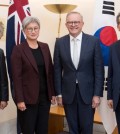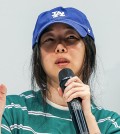- California Assembly OKs highest minimum wage in nation
- S. Korea unveils first graphic cigarette warnings
- US joins with South Korea, Japan in bid to deter North Korea
- LPGA golfer Chun In-gee finally back in action
- S. Korea won’t be top seed in final World Cup qualification round
- US men’s soccer misses 2nd straight Olympics
- US back on track in qualifying with 4-0 win over Guatemala
- High-intensity workout injuries spawn cottage industry
- CDC expands range of Zika mosquitoes into parts of Northeast
- Who knew? ‘The Walking Dead’ is helping families connect
Foreign publishers introducing Korean literature
By Chung Ah-young
Thanks to the efforts of foreign publishers and scholars, more Korean literary writings are available in various languages.
Last year, the Literature Translation Institute (LTI) of Korea began recognizing their contributions to raising the awareness of Korean literature with the LTI Korea Distinguished Service Award. This year’s award ceremony will take place on June 20.
Among numerous foreign publishers and scholars, the LTI has selected three winners from each language area — The Dalkey Archive Press (John O’Brien) for English, Adelaida F. Trotsevich for Russian and Argo (Milan Gelnar) for Czech.
The winners have been selected by the LTI’s judges, including Choe Yun, a professor of French literature at Sogang University, and poet Shin Dal-ja.
“It is encouraging that there are many candidates for the award because they have done meaningful service for the globalization of Korean literature,” Choe said.
“The award will encourage more international translators to maintain an interest in Korean literature by recognizing them and create more positive effects on the development of Korean literature in the future,” Shin said.
Last year, Claude Mouchard from French literature magazine PO&SIE, Dennis Maloney from U.S. publisher The White Pine, and Marzena Stefanska from Polish publisher Kwiaty Orientu won the awards.
United States
The Dalkey Archive Press has been recognized for its publication of a Korean literature series as part of the “Library of Korean Literature” project for English-speaking readers since 2011.
The project includes 25 Korean novels and short-story collections. The first batch of 10 books — “Stingray” (Kim Joo-young), “When Adam Opens His Eyes” (Jang Jung-il), “A Most Ambiguous Sunday, and Other Stories” (Jung Young-moon), “At Least We Can Apologize” (Lee Ki-ho), “Lonesome You” (Park Wan-suh), “One Spoon on this Earth” (Hyun Ki-young), “My Son’s Girlfriend” (Jung Young-moon), “The House with a Sunken Courtyard” (Kim Won-il), “The Soil” (Yi Kwang-su) and “No One Writes Back” (Jan Eun-jin) — were published in November 2013.
The project is seen as a remarkable attempt to bring Korean literary writings to the English-speaking publication market, as translated books represent only 2 percent of it.
The second batch of books, including Kim Nam-chon’s “Taeha: Collection of Late Short Stories,” Yi Sang’s “Short Story ollection,”Choi In-hun’s “The Square” and Ha Il-ji’s “The Republic of Uzupis,” are expected to be published this fall.
Russia
Trotsevich has been appreciated for her pivotal role in publishing the “Golden Fund of Korean Literature” project. The project was launched in 2007 by the LTI and Hyperion, a Russian publisher. As part of the project, she took part in selecting and editing the works. She has been actively engaging in nurturing Russian translators and scholars who specialize in Korean literature.
The leading Russian Korean scholar started her academic career in March 1957 at the Leningrad Branch of the Institute of Oriental Studies, the USSR Academy of Sciences in the former Soviet Union.
She is highly respected as a translator for spending time and effort to introduce Korean literature to Russian readers. Recently she has translated the Korean vernacular version of the well-known ancient novel, “The Cloud Dream of the Nine.”
Czech Republic
The Argo is taking part in the “Korean Modern Writing in Czech” project in collaboration with the LIT which kicked off in 2013 and will continue until 2016. Under the project, 10 Korean literary titles will be available in Czech over the four years.
In 2013, Han Mu-suk’s “Encounter” and Kim Young-ha’s “The Empire of Light” reached Czech readers. This year, Yi Mun-yol’s “Poets” and Shin Kyung-sook’s “I’ll Be Right Here” are expected to be published there.
Established in 1992, the publisher has released more than 1,500 titles over the last 20 years. The Argo has dealt with literary works from not only Czech authors but also world-renowned writers such as Umberto Eco and Orhan Pamuk.












